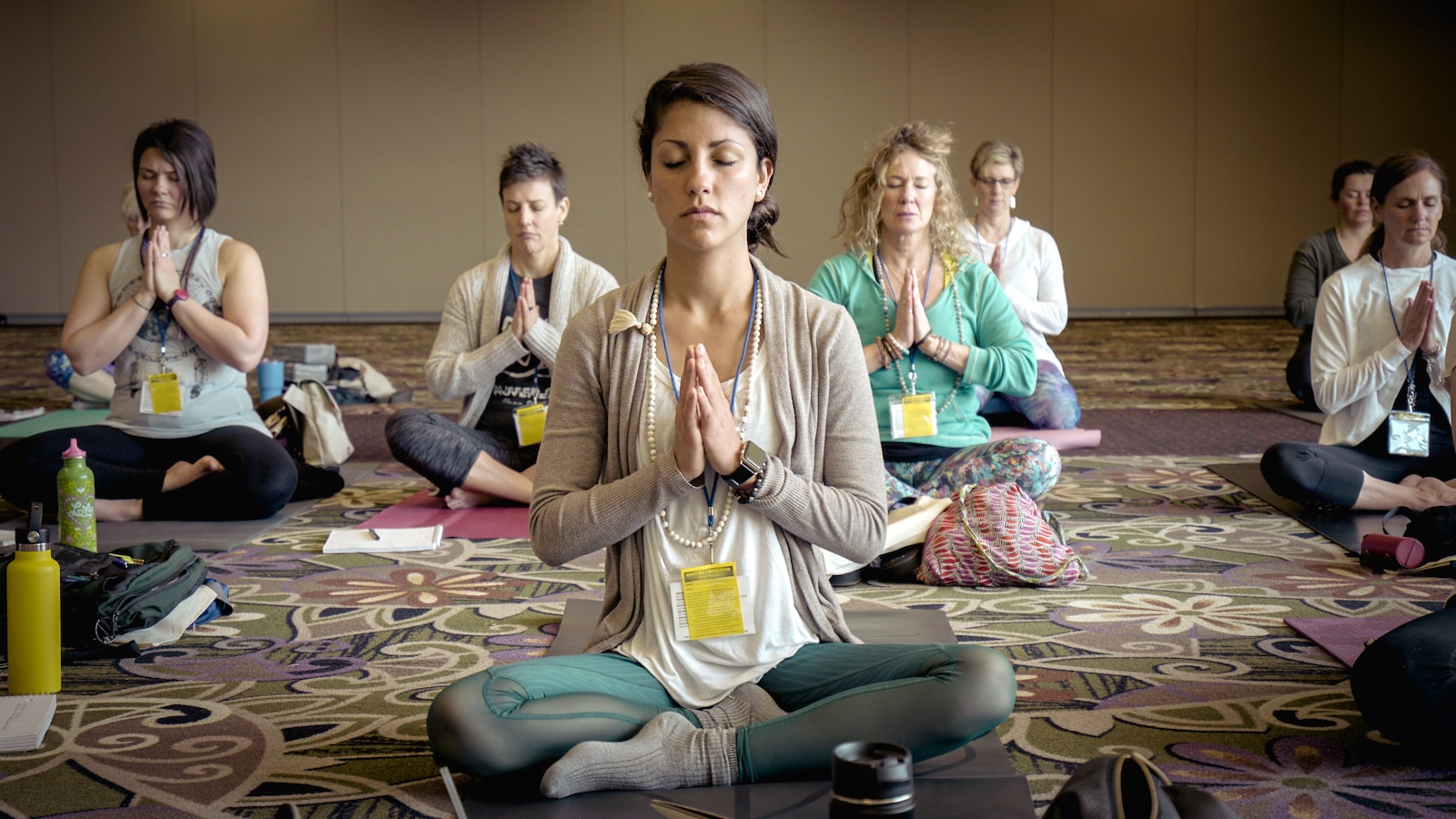Erase Stress with Ease: The Art of Mindfulness Meditation
Mindfulness Meditation: A Relaxing Way to Reduce Stress: If you’re feeling overwhelmed, stressed, or anxious, mindfulness meditation may be a helpful tool for reducing those feelings and promoting relaxation.
Mindfulness meditation is a practice that involves focusing your attention on the present moment, without judgment.
By doing so, you can become more aware of your thoughts, emotions, and physical sensations, and learn to respond to them in a more calm and centered way.
Research has shown that mindfulness meditation can be an effective way to reduce stress and anxiety, as well as improve overall well-being. One study found that participants who completed an 8-week mindfulness-based stress reduction program reported significant decreases in stress and anxiety, as well as improvements in mood and quality of life. Another study showed that mindfulness meditation can help reduce symptoms of depression and improve sleep quality. Whether you’re new to meditation or have been practicing for years, mindfulness meditation can be a valuable tool for managing stress and promoting relaxation.
Understanding Mindfulness Meditation
Mindfulness meditation is a type of meditation that involves paying attention to the present moment while acknowledging and accepting one’s thoughts and feelings without judgment. This practice helps you become more aware of your thoughts and emotions and develop a more positive relationship with them.
Concept and Philosophy
The concept of mindfulness meditation is rooted in Buddhist philosophy, which emphasizes the importance of being present in the moment and cultivating a non-judgmental attitude towards oneself and others. Mindfulness meditation can be practiced in various forms, such as sitting meditation, walking meditation, or body scan meditation.
Benefits of Mindfulness Meditation
Research has shown that mindfulness meditation can have numerous benefits for both physical and mental health. Here are some of the benefits of mindfulness meditation:
- Reduces stress and anxiety: Mindfulness meditation can help reduce stress and anxiety by promoting relaxation and reducing the activity of the amygdala, the part of the brain responsible for the fight-or-flight response.
- Improves focus and concentration: Mindfulness meditation can improve focus and concentration by training the mind to stay in the present moment and avoid distractions.
- Boosts immune system: Mindfulness meditation has been shown to boost the immune system by reducing inflammation and increasing the activity of natural killer cells, which help fight off infections and cancer.
- Enhances emotional well-being: Mindfulness meditation can enhance emotional well-being by increasing positive emotions such as joy, compassion, and gratitude, and reducing negative emotions such as anger, fear, and sadness.
Overall, mindfulness meditation is a simple yet powerful practice that can help you reduce stress, improve focus, and enhance your overall well-being.
Techniques for Mindfulness Meditation
Mindfulness Meditation: A Relaxing Way to Reduce Stress: If you’re new to mindfulness meditation, it’s important to start with simple techniques that can help you focus your attention and reduce stress. Here are two effective techniques for mindfulness meditation:
Breathing Exercises
One of the simplest and most effective techniques for mindfulness meditation is to focus on your breath. Sit in a comfortable position, close your eyes, and take a few deep breaths. Then, focus your attention on your breath as it moves in and out of your body. Notice the sensation of the air moving in and out of your nostrils or the rise and fall of your chest. If your mind starts to wander, gently bring your attention back to your breath.
To make this exercise more effective, try counting your breaths. Inhale for a count of four, hold your breath for a count of four and exhale for a count of four. Repeat this cycle several times, focusing on your breath and counting each inhale and exhale.
Body Scan Technique
The body scan technique is another effective technique for mindfulness meditation. Start by lying down on your back in a comfortable position. Close your eyes and take a few deep breaths. Then, focus your attention on your body, starting at your toes and working your way up to the top of your head. Notice any sensations or tension in each part of your body and try to release any tension as you focus on each body part.
As you scan your body, you may notice areas of tension or discomfort. Rather than trying to ignore these sensations, focus on them and try to release the tension. You can also use this technique to focus on specific parts of your body that are particularly tense or sore, such as your back or neck.
By practicing these techniques for mindfulness meditation, you can reduce stress and improve your overall well-being. Start with short meditation sessions and gradually increase the length of your sessions as you become more comfortable with the practice.
Mindfulness Meditation for Stress Reduction
Stress is a common experience that affects everyone at some point in their lives. Mindfulness meditation is a proven technique that can help reduce stress and promote relaxation. By focusing your attention on the present moment and being aware of your thoughts and feelings, you can learn to manage stress and improve your overall well-being.
Role of Mindfulness in Stress Management
Mindfulness meditation is a practice that involves paying attention to the present moment without judgment. When you are mindful, you are aware of your thoughts, feelings, and bodily sensations. This awareness can help you identify the sources of stress in your life and develop strategies to manage them.
Research has shown that mindfulness meditation can reduce symptoms of anxiety and depression, improve sleep quality, and enhance overall well-being. By practicing mindfulness regularly, you can train your mind to focus on the present moment and let go of negative thoughts and emotions.
Practical Tips for Stress Reduction
If you are new to mindfulness meditation, here are some practical tips to help you get started:
- Find a quiet and comfortable place to meditate.
- Set aside a specific time each day to practice mindfulness.
- Begin by focusing on your breath. Notice the sensation of air moving in and out of your body.
- If your mind wanders, gently bring your attention back to your breath.
- Start with short meditation sessions and gradually increase the length of your practice.
- Use guided meditation apps or videos to help you stay focused.
In addition to mindfulness meditation, there are other techniques you can use to manage stress, such as deep breathing, progressive muscle relaxation, and visualization. Experiment with different techniques to find what works best for you.
In conclusion, mindfulness meditation is a powerful tool for reducing stress and promoting relaxation. By practicing mindfulness regularly, you can train your mind to focus on the present moment and let go of negative thoughts and emotions. Try incorporating mindfulness into your daily routine and see how it can benefit your overall well-being.
Mindfulness Meditation for Relaxation
If you’re feeling stressed and overwhelmed, mindfulness meditation can be an effective way to reduce stress and promote relaxation. By practicing mindfulness, you can become more aware of your thoughts and emotions and learn to manage them in a more productive way. In this section, we’ll explore how you can incorporate mindfulness into your daily routine and use it as a relaxation technique.
Incorporating Mindfulness in Daily Routine
One of the best ways to incorporate mindfulness into your daily routine is to set aside time each day for meditation. Start by finding a quiet, comfortable place where you won’t be disturbed.
Sit in a comfortable position, with your back straight and your feet flat on the floor. Close your eyes and focus on your breath, noticing the sensation of air moving in and out of your body. If your mind starts to wander, gently bring your attention back to your breath.
You can also practice mindfulness throughout the day by paying attention to your senses. Notice the sights, sounds, smells, and tastes around you, without judgment or analysis. This can help you stay present in the moment and reduce stress and anxiety.
Relaxation Techniques
Mindfulness Meditation: A Relaxing Way to Reduce Stress: Mindfulness meditation can also be used as a relaxation technique. By focusing on your breath and letting go of distracting thoughts, you can promote a sense of calm and relaxation. Here are some mindfulness meditation techniques you can try:
- Body scan meditation: Lie down on your back and close your eyes. Focus on your breath, and then slowly bring your attention to different parts of your body, starting with your toes and working your way up to your head. Notice any sensations or tension in each part of your body, and then release it as you exhale.
- Loving-kindness meditation: Sit in a comfortable position and close your eyes. Imagine someone you love, and silently repeat phrases of love and kindness to them. Then, imagine yourself and repeat the same phrases of love and kindness to yourself.
- Walking meditation: Find a quiet place to walk, preferably outdoors. Focus on your breath and the sensation of your feet touching the ground. If your mind starts to wander, gently bring your attention back to your breath and your surroundings.
By incorporating mindfulness into your daily routine and practicing relaxation techniques, you can reduce stress and promote a sense of calm and well-being.
Maintaining Consistency in Practice
Maintaining consistency in your mindfulness meditation practice is key to reaping the benefits of stress reduction and relaxation. Here are some tips to help you stay on track.
Creating a Meditation Schedule
One of the best ways to maintain consistency is to create a meditation schedule. Choose a time of day that works best for you, whether it’s first thing in the morning, during your lunch break, or before bed. Set aside at least 5-10 minutes each day for meditation, and gradually increase the time as you become more comfortable with the practice.
Use a calendar or planner to schedule your meditation sessions and treat them as you would at any other appointment. This will help you stay accountable and make meditation a regular part of your routine.
Overcoming Common Challenges
It’s important to acknowledge that maintaining consistency in your mindfulness meditation practice can be challenging at times. Here are some familiar challenges you may encounter, along with tips for overcoming them:
- Lack of motivation: If you’re feeling unmotivated to meditate, remind yourself of the benefits you’ll experience, such as reduced stress and improved focus. You may also find it helpful to set small goals for yourself, such as meditating for 5 minutes each day for a week.
- Distractions: It’s natural to experience distractions during meditation, such as thoughts, bodily sensations, or external noises. When this happens, simply acknowledge the distraction, and gently redirect your focus back to your breath or chosen meditation object.
- Difficulty sitting still: If you find it difficult to sit still for extended periods of time, try incorporating movement into your meditation practice. You can try walking meditation, yoga, or other gentle exercises that promote mindfulness.
By creating a meditation schedule and overcoming shared challenges, you can maintain consistency in your mindfulness meditation practice and experience the many benefits of stress reduction and relaxation.
Embark on a journey to holistic health with fasting and Mindfulness Meditation
Mindfulness meditation is a proven method for reducing stress and promoting relaxation.
It involves focusing on the present moment without judgment or distraction.
By doing so, you can develop a greater awareness of your thoughts and emotions and learn to manage them more effectively, according to Mindful.Org https://www.mindful.org/how-to-manage-stress-with-mindfulness-and-meditation/ meditation for stress allows you to find calm to face challenging situations with clarity, compassion, and intention.
There are many resources available for learning and practicing mindfulness meditation, including guided meditations like those found on:
YouTube – (https://youtube.com/watch?v=z6X5oEIg6Ak)
20-Minute Guided Meditation for Reducing Anxiety and Stress—Clear the Clutter to Calm Down – (https://youtube.com/watch?v=MIr3RsUWrdo)
Mindfulness-Based Stress Reduction (MBSR), which is effective in reducing stress and improving overall well-being – APA – https://www.apa.org/topics/mindfulness/meditation
[Mayo Clinic – https://www.mayoclinic.org/tests-procedures/meditation/in-depth/meditation/art-20045858
Harvard Gazette – https://news.harvard.edu/gazette/story/2018/04/less-stress-clearer-thoughts-with-mindfulness-meditation/
Positive Psychology – https://positivepsychology.com/mindfulness-based-stress-reduction-mbsr/
Conclusion
In conclusion, mindfulness meditation is a powerful tool that can help you reduce stress and anxiety, improve your mental and physical health, and increase your overall sense of well-being.
By practicing mindfulness meditation regularly, you can learn to be more present in the moment, develop greater self-awareness, and cultivate a greater sense of compassion and empathy for others.
Whether you’re new to meditation or have been practicing for years, there are many resources available to help you get started or deepen your practice.
From guided meditations to mindfulness apps and online courses, there are many ways to incorporate mindfulness meditation into your daily routine.
Remember, mindfulness meditation is not a quick fix or a cure-all for all of life’s problems. It requires patience, persistence, and a willingness to be present with whatever arises in the moment.
But with practice, you can learn to cultivate greater peace, clarity, and resilience in the face of life’s challenges.
So why not give mindfulness meditation a try? Whether you’re looking to reduce stress, improve your mental and physical health, or simply cultivate greater presence and awareness in your daily life, mindfulness meditation can be a powerful tool to help you achieve your goals.
Elizabeth Redd: I am a passionate advocate for Health and Healing, dedicated to empowering individuals to live their best lives.
As the founder and publisher of Health and Healing, I have established myself as a guiding force in the wellness industry.
I am committed to providing the latest research, holistic approaches, and inspiring stories to open new possibilities for your health and healing journey.
Learn more about Elizabeth and Join Us at Health and Healing. Also, check out My About Page.









0 Comments